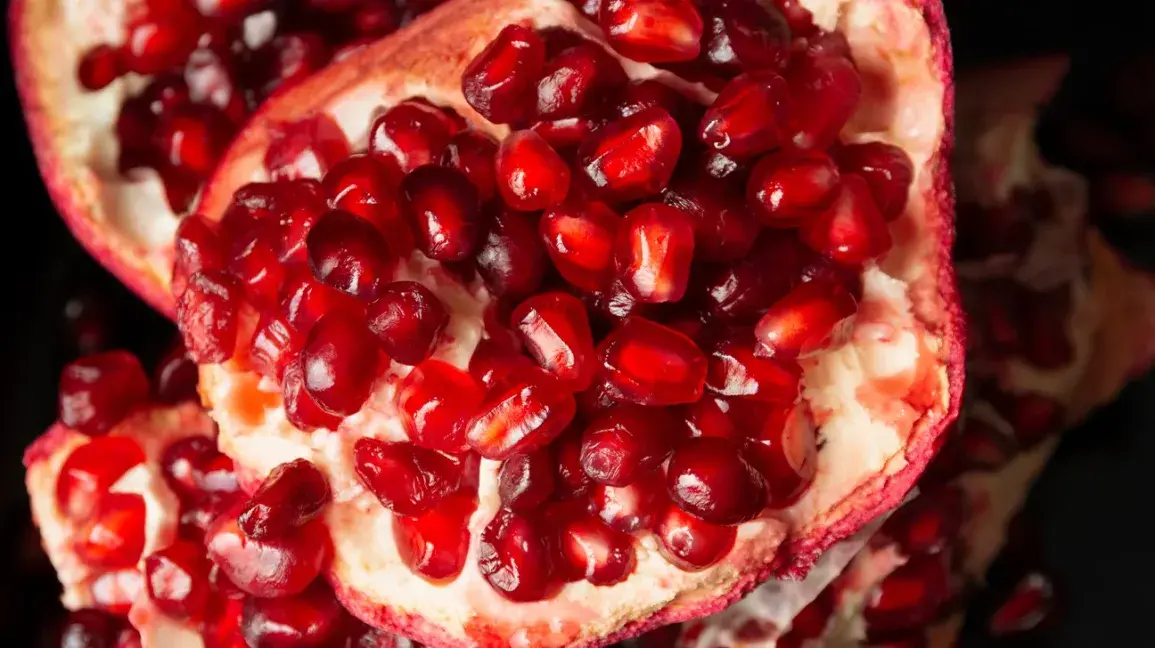Introduction
Crack open a pomegranate and you’re greeted with a jeweled universe of ruby-red seeds, each bursting with juice that stains your fingers and, if you’re not careful, your shirt. But beyond their dramatic flair lies something far more valuable an arsenal of polyphenols, natural plant compounds linked with anti-inflammatory, heart-protective, and even anti-cancer effects.
The pomegranate has been revered for thousands of years, from Persian gardens to Ayurvedic medicine, and modern science is finally catching up. Research suggests these ancient fruits may do more than brighten your salad they could be a daily defense system for your cells.
This guide takes you through the science, the health benefits, and the practical ways to harness the power of pomegranates without needing a culinary degree.
What Makes Pomegranates Special? The Polyphenol Factor
Pomegranates are rich in polyphenols—specifically tannins, flavonoids, and anthocyanins. The star player, however, is punicalagin, a type of polyphenol unique to pomegranates and found in both the juice and peel.
These compounds act as antioxidants, reducing oxidative stress, the same cellular “rust” that contributes to chronic diseases like cancer, diabetes, and heart disease. According to research published in Oxidative Medicine and Cellular Longevity, punicalagins are so potent that they outshine the antioxidants in red wine and green tea.
Pomegranates and Cancer Prevention
DNA Protection and Cell Growth Control
Oxidative stress and chronic inflammation are twin pathways toward cancer. Pomegranate polyphenols tackle both, protecting DNA from damage while interfering with the signaling processes cancer cells use to multiply.
In a study published in Prostate Cancer and Prostatic Diseases, men with prostate cancer who drank pomegranate juice daily saw a significant slowdown in rising PSA levels (a marker of cancer progression).
Colon and Breast Cancer Links
Animal and lab studies also suggest benefits for colon and breast cancers. Compounds in pomegranates have been shown to suppress inflammatory enzymes and reduce tumor size in experimental models. While more human trials are needed, the evidence is promising enough to keep pomegranates in the nutritional spotlight.
Heart Health: Where Pomegranates Shine Brightest
Pomegranates may be a friend to your arteries as much as your cells. Research in the American Journal of Clinical Nutrition found that daily pomegranate juice improved blood flow and reduced arterial plaque in patients with coronary heart disease.
Here’s a quick breakdown of how pomegranates support cardiovascular health:
| Benefit | Mechanism | Supporting Study |
|---|---|---|
| Reduced arterial plaque | Polyphenols decrease LDL oxidation | AJCN |
| Improved blood pressure | Nitric oxide production, vessel relaxation | Clinical Nutrition |
| Better circulation | Increased antioxidant activity in vessels | Nutrition Reviews |
Gut Health and the Microbiome Connection
Here’s where things get really interesting: pomegranates don’t just feed you—they feed your gut bacteria. Polyphenols are metabolized into beneficial compounds like urolithins, which have been linked with reduced inflammation and improved mitochondrial function.
A review in Frontiers in Nutrition suggests that urolithins may help reduce colon cancer risk and even slow age-related decline. In other words, eating pomegranates could help your gut microbiome return the favor by producing protective compounds your body can actually use.
How to Add Pomegranates to Your Diet
The real beauty of pomegranates is their versatility. You don’t need to overhaul your routine—just a few smart swaps:
- Juice it (but wisely): Go for pure pomegranate juice without added sugars. A small glass daily goes a long way.
- Seed sprinkle: Add arils (the edible seeds) to salads, yogurt, or oatmeal.
- Cooking twist: Use pomegranate molasses for a tart-sweet glaze on meats or roasted veggies.
- Smoothie upgrade: Blend with berries, spinach, and almond milk for a nutrient-rich shake.
💡 Tip: Fresh seeds give you the full benefit of fiber and antioxidants. Juices concentrate the polyphenols but lack the fiber.
Pomegranates vs. Other Antioxidant Superstars
| Food | Key Compound | Antioxidant Strength |
|---|---|---|
| Pomegranates | Punicalagin | Very high |
| Blueberries | Anthocyanins | High |
| Green Tea | EGCG catechins | Moderate |
| Dark Chocolate | Flavanols | Moderate–High |
While blueberries and green tea often steal the spotlight, pomegranates belong in the same conversation—especially because punicalagins are unique to them. Pairing these foods creates nutrient synergy, amplifying protective effects.
The Reality Check: Not a Cure, But a Tool
Let’s set the record straight: pomegranates aren’t a miracle cure. No single food is. But adding them to a balanced diet rich in plants, healthy fats, and lean proteins can tip the scales toward better health.
Think of them as a stylish accessory—never the whole outfit, but the detail that pulls everything together.
The Takeaway
Pomegranates aren’t just exotic fruit—they’re a powerhouse of polyphenols that support your heart, protect your DNA, and feed your gut microbiome. The science is strong, the flavor is irresistible, and the practical ways to enjoy them are endless.
So the next time you spot those crimson orbs at the market, don’t just walk past. Crack one open. Eat the jewels. Your body will thank you.
FAQs
1. How much pomegranate should I eat daily?
Half to one fruit (or a small glass of pure juice) is a realistic and beneficial amount.
2. Is pomegranate juice as healthy as the seeds?
Juice is concentrated in polyphenols but lacks fiber. Ideally, include both.
3. Do pomegranates help lower cholesterol?
Yes. Studies suggest they can reduce LDL oxidation, a driver of plaque buildup.
4. Can pomegranates interact with medications?
They may affect how the body processes certain drugs, like statins. Always check with your doctor if you’re on long-term medication.
5. Are there differences between fresh pomegranates and supplements?
Supplements may provide extracts, but they often miss the nutrient synergy found in whole fruit.
Leave a comment
Your email address will not be published. Required fields are marked *



